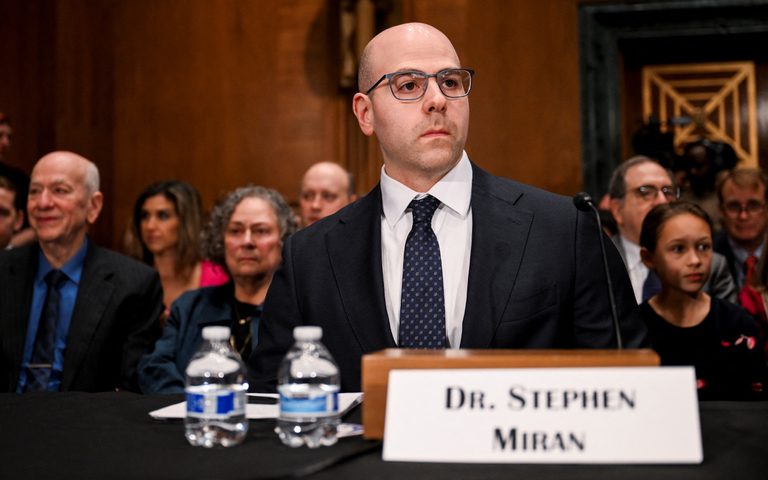Trump advisers suggest reforms
Saudi Arabia has $127bn of the bonds
No concrete proposals yet
Economic advisers to President Donald Trump have proposed radical policies that could dim the allure of US government bonds for Gulf sovereign investors.
The bonds, commonly known as treasuries, are considered among the lowest-risk investments. Many countries with excess dollars – from trade surpluses with the US or the sale of dollar-denominated goods such as oil – buy vast amounts of the instruments.
As of January 2025 Saudi Arabia held $126.9 billion of US treasuries, the UAE owned $92.6 billion and Kuwait had $49.2 billion.
These dollarised IOUs, on which the US pays interest but rolls over rather than repays, have enabled Washington to raise its public debt to $36 trillion, up sixfold this century.
Debt interest payments were $74 billion in February alone and the Trump administration is mulling ways to reduce the burden.
Stephen Miran, who is now chairman of the president’s Council of Economic Advisers, argued in a paper published last November that a US security umbrella was a “public good” and that countries benefiting from it should fund it by buying US treasuries.
Although Miran did not specify nations, this would include the six members of the Gulf Cooperation Council.
 Reuters/Annabelle Gordon
Reuters/Annabelle GordonHe also said existing treasury holdings could be exchanged for bonds with century-long durations. Countries that refuse to swap would have tariffs imposed on them.
Voicing such ideas is unlikely to diminish US treasuries’ safe-haven status due to the lack of alternatives aside from gold, says Karen Young, a senior research scholar at the Center on Global Energy Policy at Columbia University.
Nevertheless, for Gulf sovereign wealth funds “there is a sense of moving some geographical exposure and looking for alternative yields and more strategic investments” even as the US remains their top investment destination, she says.
Joseph Wang, chief investment officer at Monetary Macro and a former trader on the Federal Reserve’s open markets desk, describes Miran’s ideas as possible tools rather than concrete proposals.
Wang says the idea is that America’s allies hold US debt which is lower yielding, reducing the interest expense for Washington.
But, he says, “there’s no indication from the administration that it would do this, although the subtext is that this would be consensual. If it were done in a non-consensual fashion, that would be very negative for treasury demand – no one wants to suddenly see their treasuries converted into, say, 100-year bonds.”
Gulf countries’ treasury strategies have diverged of late. Saudi Arabia has cut its treasuries holdings by nearly a third from a July 2019 peak of $184 billion, but the UAE now owns a record amount and Kuwait hit a similar milestone last October.
“The public balance sheets of GCC states now are very complex,” says Young. “Just holding onto US treasuries is no longer a viable long-term state investment strategy. GCC governments have increased their risk exposure appetite and demand for returns.”
Dollar devaluation
Trump adviser Stephen Miran has also claimed that foreigners accumulating US treasuries is a cause of dollar overvaluation, which unfairly hurts US manufacturers. He suggested levying a user fee on foreign US treasury holders by withholding some of the interest payments due to them, which would lower demand for these bonds and weaken the greenback.
Yet this would also potentially raise yields, warns Wang, which would be the opposite of what Trump wants. Yields and bond prices are inversely correlated, so reduced demand lowers prices and raises yields.
Aside from Kuwait, Gulf currencies are pegged to the dollar. So, a weaker dollar would increase the region’s import costs for non-dollar-denominated goods and services but make its exports cheaper.
“The political ties between the Gulf countries and the US remain strong,” adds Wang. “I don’t see a reason for them to turn away from US investments currently.”
Register now: It’s easy and free
AGBI registered members can access even more of our unique analysis and perspective on business and economics in the Middle East.
Why sign uP
Exclusive weekly email from our editor-in-chief
Personalised weekly emails for your preferred industry sectors
Read and download our insight packed white papers
Access to our mobile app
Prioritised access to live events
Already registered? Sign in
I’ll register later



